This year at The Digital Public Library of America (DPLA) Fest 2017 in Chicago, I had the opportunity to attend the Making the Case for Sustaining Your Digital Library Workshop. The workshop was hosted by two employees of the Foundation Center and was sponsored by a grant from the Knight Foundation.
The large group of us gathered in Chicago Public Library’s Harold Washington Library Center as a part of Hubs the day before the conference. The workshop participants were led through helpful activities and discussions, given grant-seeking insider knowledge, and had time to practice using the methods. We also brainstormed ideas to help us better communicate and build relationships with potential funders. One activity I enjoyed was called Roses, Thorns, and Buds wherein participants were asked to write down on colorful post-it notes the Positives (Roses), Challenges (Thorns), and Opportunities (Buds) for the projects we were looking to sustain. Group members then clustered the ideas to identify trends that were both plaguing and encouraging across our institutions.
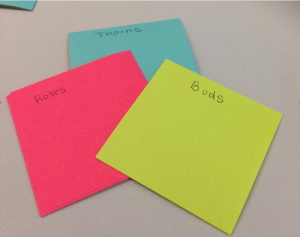 Another fun activity involved coaching us on how to pitch our projects to supporters. We were instructed to identify the parts of a successful pitch: our project’s unique value, what actual needs it addresses, our goals and objectives for the project, how its success will be evaluated, and how funders could offer their support. We got time to write out our case. And we were given a chance to practice pitching our projects in small groups complete with fake money which each member could donate to projects he or she wanted to support.
Another fun activity involved coaching us on how to pitch our projects to supporters. We were instructed to identify the parts of a successful pitch: our project’s unique value, what actual needs it addresses, our goals and objectives for the project, how its success will be evaluated, and how funders could offer their support. We got time to write out our case. And we were given a chance to practice pitching our projects in small groups complete with fake money which each member could donate to projects he or she wanted to support.
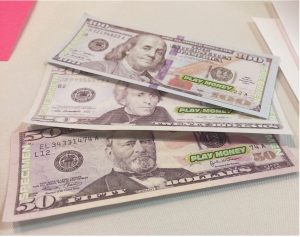 The Foundation 101 portion of the workshop provided definitions for different kinds of foundations (e.g. individual, company-sponsored, direct corporate giving, etc.) and their motives for giving (individual interests of foundation family members, tax benefits etc.). The facilitators also offered suggestions on building a relationship with foundations by getting an idea of the fit and available resources before a sending an application or proposal.
One special feature of the workshop was the Visualizing Funding for Libraries Data Tool the Foundation Center developed for tracking and identifying potential funders and their recipients. The tool is built on approximately 990 tax donation forms and information the Foundation Center received directly from foundations with whom they have relationships.
The Foundation 101 portion of the workshop provided definitions for different kinds of foundations (e.g. individual, company-sponsored, direct corporate giving, etc.) and their motives for giving (individual interests of foundation family members, tax benefits etc.). The facilitators also offered suggestions on building a relationship with foundations by getting an idea of the fit and available resources before a sending an application or proposal.
One special feature of the workshop was the Visualizing Funding for Libraries Data Tool the Foundation Center developed for tracking and identifying potential funders and their recipients. The tool is built on approximately 990 tax donation forms and information the Foundation Center received directly from foundations with whom they have relationships.
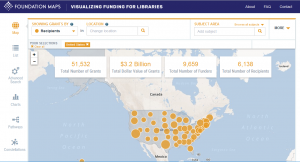 The tool provides funder and recipient information and amounts for organizations all over the country. It lets you search by many options including subject, year, and organization type. It also offers charts of which organizations may receive funding and whom they may be supporting. We participants were encouraged to locate 5-10 prospective foundations with whom we could cultivate relationships, develop 2-3 reasons they would make a good fit, and brainstorm ways to first approach them. I was very impressed with the workshop and the data tool’s functionality. I left the workshop with a much clearer idea as to how to go about acquiring external funding.
The tool provides funder and recipient information and amounts for organizations all over the country. It lets you search by many options including subject, year, and organization type. It also offers charts of which organizations may receive funding and whom they may be supporting. We participants were encouraged to locate 5-10 prospective foundations with whom we could cultivate relationships, develop 2-3 reasons they would make a good fit, and brainstorm ways to first approach them. I was very impressed with the workshop and the data tool’s functionality. I left the workshop with a much clearer idea as to how to go about acquiring external funding.
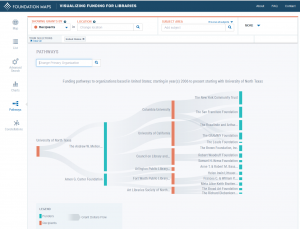 Want to learn more about the Data Tool? A free training video highlights the different features of the tool here ( https://www.webjunction.org/events/webjunction/visualizing-and-finding-funding-for-libraries.html ). More training that will be available later this year.
By
Marcia McIntosh
Digital Production Librarian
Want to learn more about the Data Tool? A free training video highlights the different features of the tool here ( https://www.webjunction.org/events/webjunction/visualizing-and-finding-funding-for-libraries.html ). More training that will be available later this year.
By
Marcia McIntosh
Digital Production Librarian
 Another fun activity involved coaching us on how to pitch our projects to supporters. We were instructed to identify the parts of a successful pitch: our project’s unique value, what actual needs it addresses, our goals and objectives for the project, how its success will be evaluated, and how funders could offer their support. We got time to write out our case. And we were given a chance to practice pitching our projects in small groups complete with fake money which each member could donate to projects he or she wanted to support.
Another fun activity involved coaching us on how to pitch our projects to supporters. We were instructed to identify the parts of a successful pitch: our project’s unique value, what actual needs it addresses, our goals and objectives for the project, how its success will be evaluated, and how funders could offer their support. We got time to write out our case. And we were given a chance to practice pitching our projects in small groups complete with fake money which each member could donate to projects he or she wanted to support.
 The Foundation 101 portion of the workshop provided definitions for different kinds of foundations (e.g. individual, company-sponsored, direct corporate giving, etc.) and their motives for giving (individual interests of foundation family members, tax benefits etc.). The facilitators also offered suggestions on building a relationship with foundations by getting an idea of the fit and available resources before a sending an application or proposal.
One special feature of the workshop was the Visualizing Funding for Libraries Data Tool the Foundation Center developed for tracking and identifying potential funders and their recipients. The tool is built on approximately 990 tax donation forms and information the Foundation Center received directly from foundations with whom they have relationships.
The Foundation 101 portion of the workshop provided definitions for different kinds of foundations (e.g. individual, company-sponsored, direct corporate giving, etc.) and their motives for giving (individual interests of foundation family members, tax benefits etc.). The facilitators also offered suggestions on building a relationship with foundations by getting an idea of the fit and available resources before a sending an application or proposal.
One special feature of the workshop was the Visualizing Funding for Libraries Data Tool the Foundation Center developed for tracking and identifying potential funders and their recipients. The tool is built on approximately 990 tax donation forms and information the Foundation Center received directly from foundations with whom they have relationships.
 The tool provides funder and recipient information and amounts for organizations all over the country. It lets you search by many options including subject, year, and organization type. It also offers charts of which organizations may receive funding and whom they may be supporting. We participants were encouraged to locate 5-10 prospective foundations with whom we could cultivate relationships, develop 2-3 reasons they would make a good fit, and brainstorm ways to first approach them. I was very impressed with the workshop and the data tool’s functionality. I left the workshop with a much clearer idea as to how to go about acquiring external funding.
The tool provides funder and recipient information and amounts for organizations all over the country. It lets you search by many options including subject, year, and organization type. It also offers charts of which organizations may receive funding and whom they may be supporting. We participants were encouraged to locate 5-10 prospective foundations with whom we could cultivate relationships, develop 2-3 reasons they would make a good fit, and brainstorm ways to first approach them. I was very impressed with the workshop and the data tool’s functionality. I left the workshop with a much clearer idea as to how to go about acquiring external funding.
 Want to learn more about the Data Tool? A free training video highlights the different features of the tool here ( https://www.webjunction.org/events/webjunction/visualizing-and-finding-funding-for-libraries.html ). More training that will be available later this year.
By
Marcia McIntosh
Digital Production Librarian
Want to learn more about the Data Tool? A free training video highlights the different features of the tool here ( https://www.webjunction.org/events/webjunction/visualizing-and-finding-funding-for-libraries.html ). More training that will be available later this year.
By
Marcia McIntosh
Digital Production Librarian


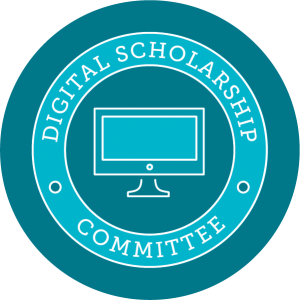
Leave a Reply